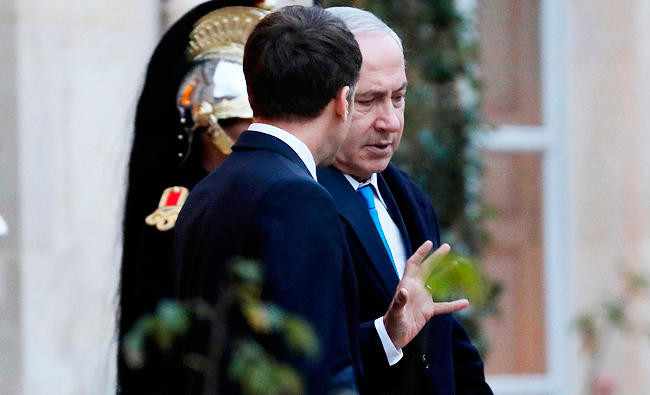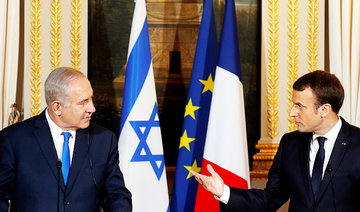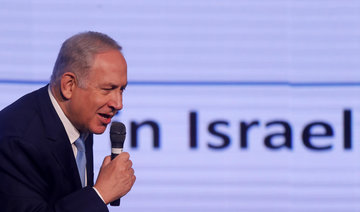BRUSSELS: Israel’s leader faces renewed pressure from Europe on Monday to reboot the Middle East’s moribund peace process following widespread criticism of the US decision to recognize Jerusalem as the Jewish state’s capital.
Prime Minister Benjamin Netanyahu will be in Brussels for an informal breakfast with EU foreign ministers who will urge him to “resume meaningful negotiations,” according to the bloc’s diplomatic chief Federica Mogherini.
The talks come after French President Emmanuel Macron met Netanyahu in Paris on Sunday and called on him to freeze settlement building and to re-engage with Palestinians following widespread protests over the US move.
Last week’s decision by the administration of US President Donald Trump upended decades of US diplomacy and broke with international consensus.
Speaking alongside Netanyahu on Sunday, Macron again condemned the decision as “contrary to international law and dangerous for the peace process.”
“I urged the prime minister to show courage in his dealings with the Palestinians to get us out of the current dead end,” Macron said after talks in Paris with the Israeli leader.
“Peace does not depend on the United States alone... it depends on the capacity of the two Israeli and Palestinian leaders to do so,” the French leader said.
Netanyahu has praised Trump’s decision as “historic” and he explained Sunday that Jerusalem “has always been our capital and it has never been the capital of any other people.”
“It has been the capital of Israel for 3,000 years, it has been the capital of the Jewish state for 70 years. We respect your history and your choices and we know that as friends you respect ours. I think this is also central for peace,” he said.
“The sooner the Palestinians come to grips with this reality, the sooner we’ll move toward peace.”
Before leaving Israel, Netanyahu had taken aim at what he called Europe’s “hypocrisy,” for condemning Trump’s statement, but not “the rockets fired at Israel or the terrible incitement against it.”
Pointedly, Macron began his pre-prepared remarks with a clear condemnation “with the greatest of clarity of all forms of attacks in the last hours and days against Israel.”
Despite the obvious differences between the 39-year-old French leader and the Israeli hard-liner, there were also attempts to show they had developed a good early working relationship and held common views.
“Does this mean Emmanuel Macron and me agree on everything? No, not all of it, but we’re working it,” Netanyahu said at one point, joking later: “The lunch in the Elysee is superb, the conversation is superb too.”
The two countries are keen to reset ties after often difficult exchanges under ex-president Francois Hollande.
Most EU members, including the bloc’s biggest countries, have expressed alarm over the Trump administration’s policy shift.
Mogherini has warned the decision on Jerusalem “has the potential to send us backwards to even darker times than the ones we’re already living in.”
Speaking to reporters in Brussels on Friday, she repeated Europe’s stance that “the only realistic solution” for peace was two states — Israel and Palestine — with Jerusalem as the capital of both and the borders returned to their status before the 1967 Arab-Israeli War.
“It is in Israel’s security interest to find a lasting solution to this decades-long conflict,” she added.
But the 28-member block is not unified on the issue — Hungary, Greece, Lithuania and the Czech Republic in particular favor warmer ties with Israel.
Last week Hungary broke ranks to block a joint statement from the EU that was critical of Washington’s Jerusalem shift.
Trump’s announcement on Wednesday has been followed by days of protests and clashes in the Palestinian territories.
Four Palestinians were killed either in clashes or from Israeli air strikes in retaliation for rockets fired from the Gaza Strip.
Tens of thousands have also protested in Muslim and Arab countries, including Jordan, Turkey, Pakistan and Malaysia.
Further protests were held in Lebanon, Indonesia, Egypt and the Palestinian territories on Sunday.
Macron was also asked if France would attempt to launch another peace initiative to resolve the Israeli-Palestinian conflict following failed efforts in the past.
“There’s a desire by the Americans to mediate which remains and I don’t want to condemn it ab initio (from the beginning),” he said. “We need to wait for the next few weeks, the next months to see what will be proposed.
“And I think we have to wait to see whether the interested parties accept it or not.”
Netanyahu was an outspoken critic of efforts by former French president Hollande to push a Middle East peace process.
















